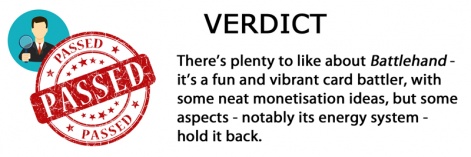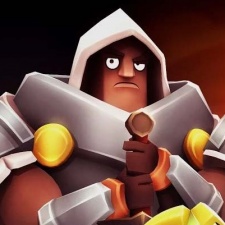Welcome back to the In-App Purchase Inspector - our regular look at free-to-play games from the consumer's perspective.
In each instalment, we consider the incentives or pressure applied to make in-app purchases, their perceived value, the expansion offered by IAPs and the overall value of the experience.
The end goal is to see whether the game makes a good enough case for us to part with our cash, or whether players are content - or engaged enough - to 'freeload'
This time, we're taking a look at BattleHand, a new turn-based card battler published by Kongregate and developed by London studio Another Place Productions.
The hand you're dealt
BattleHand is a fantasy-themed card battler, but you've heard that plenty of times before.
What's more likely to turn heads is that some core members of Another Place Productions, the studio behind the game, have previously worked on the popular action RPG series Fable.
In terms of gameplay, the most apt comparison of recent times would be Star Wars: Galaxy of Heroes. And, much like EA's effort, it has no ambitions to break new ground for the genre.
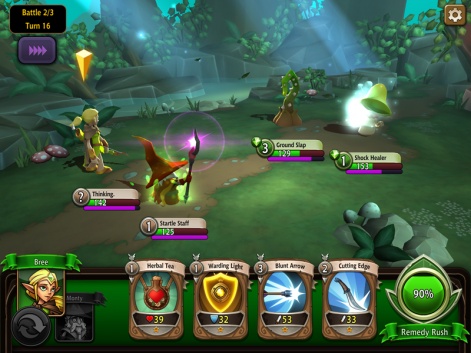
It has, however, subtly carried over the whimsical tone that defined the Fable games. BattleHand exists not in a super-serious, hard-bitten fantasy world, but a vibrant and ever-so-slightly British one.
BattleHand is a fantasy-themed card battler, but you've heard that plenty of times before.
It's got bright, caricature-esque takes on archetypal fantasy characters, death animations that involve elegantly pirouetting into conveniently-appearing coffins, and evil skull enemies named 'Bonce'.
As a non-Star Wars fan, I'd take that over stormtroopers and lightsabers any day of the week.
The ace in the pack?
Thematic preferences aside, however, Star Wars: Galaxy of Heroes remains a high watermark for games of this kind - particularly when it comes to generous monetisation.
And while they are two distinct games, with Galaxy of Heroes still fresh in the mind it's almost inevitable to compare the two in some ways.
For instance, after 'playing' Galaxy of Heroes by mostly letting it play itself, it's notable that BattleHand takes a more western approach of allowing auto-play only once you've completed a dungeon manually.
As such, here you spend a lot longer in battle and therefore slightly less on what actually matters - the card-collection and upgrading metagame.
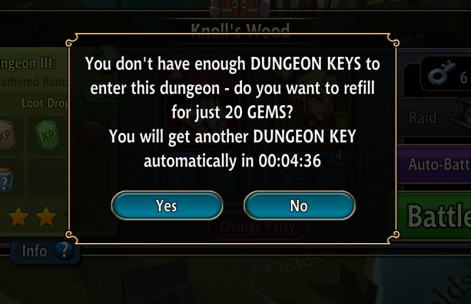
Another bugbear is BattleHand's energy system, which feels tighter than Galaxy of Heroes' in terms of disrupting play sessions.
You scratch my back...
However, what BattleHand has in common with EA's effort is that it focuses heavily on retention and reciprocity ahead of a quick buck.
You're given a free bronze card pack as part of the tutorial, along with a 50 Gems for exiting the tutorial phase.
Starting off, you're given a free bronze card pack (normally priced at 50 Gems, worth $1.00) as part of the tutorial, along with a further 50 Gems for exiting the tutorial phase.
This is quite generous, but fairly standard - the game understandably wants to introduce you to card packs, as that's where it wants you to spend money later down the line.
However, when returning to the store post-tutorial (with the full intention to spend) I was greeted with another free pack - silver this time, worth 150 Gems/$3.00 - with the jokey explanation that “the shopkeeper must have a soft spot for [female squad member] Bree.”
Not only does this constitute a quite substantial value of free items - with a further, final bronze pack also given away soon after - but it's neatly presented, and the first time I've seen reciprocity established within the game world.
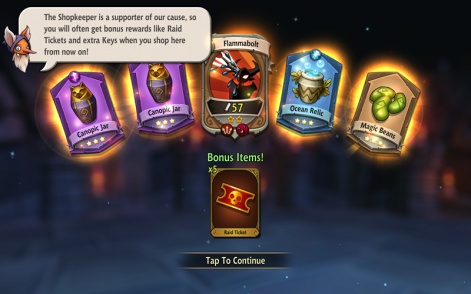
It continues, too; when you buy your first gem pack (more on this later), you're told that “the shopkeeper is a supporter of our cause, so you will often get bonus rewards like Raid Tickets [allow you to collect the rewards from previously completed dungeons immediately] and extra Keys [energy] when you shop here from now on.”
It may seem throwaway, but it being established early on that the shopkeeper is a character in his own right - and one on your side, no less, prone to acts of kindness - is a really smart move in encouraging spending.
(Battle)Handfuls of cash
The currencies in BattleHand are what you'd expect: Gold is the soft currency, Gems the hard, and energy takes the form of Keys.
Gold is always in pretty plentiful supply, and is used to upgrade characters and cards.
As for Gems, they come in bundles ranging from 250 for $4.99 to 8,000 for $99.99. To encourage spending, particularly at higher levels, there is also a Buy One Get Free offer for the first-time purchase of any bundle.
This is not a starter offer, and remains in place until you deign to spend - a shrewd system that encourages players to increase their spending each time to catch the one-time offer.
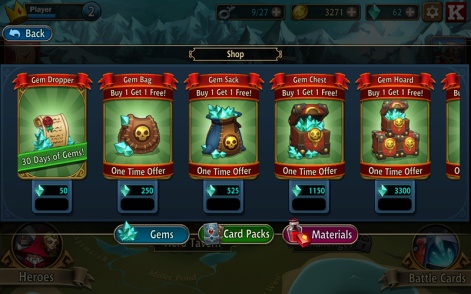
In other retailing aspects, though, BattleHand is more expensive than you'd expect.
For instance, it sets its sights high immediately with a $14.99 starter bundle, which is more than I'd ever want to spend on a F2P game I'd barely scratched the surface of.
There's also a daily Gems offer, as used to great effect in Galaxy of Heroes and COLOPL Rune Story, but here it prices itself out of being effective.
You see, such a system is an attempt to boost retention by ensuring that players check in daily to claim what they paid for. However, at $13.99 it seems like something that only a relatively dedicated player would consider in the first place.
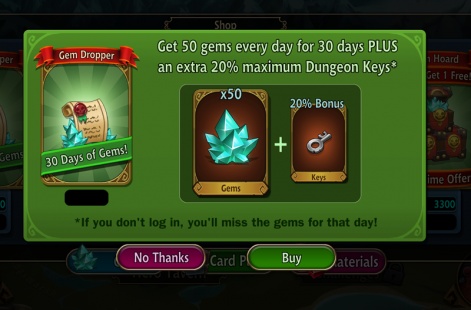
In Rune Story, it's priced at a level that entices new players, and therefore plays an important role in retaining them. Here, it's hard to envisage the same happening at such a price.
Time to spend
When it was time for me to spend, then, I went for the lowest tier - 250 Gems at $4.99.
This proved good value, and that 250 Gems - along with a fairly steady dripfeed that comes through completing objectives - allowed the purchase of a few card and material packs.
BattleHand is an unarguably enjoyable and accomplished card battler.
However, more than I would consider ideal was exhausted on restoring the game's energy system (Keys) at 20 Gems a pop, which otherwise replenishes at a rate of 5 minutes per Key.
It's not the worst I've seen, and I guess it's a testament to the quality of the game itself that I seek longer sessions, but it does ever-so-slightly sour the experience.
As it stands, then, BattleHand is an unarguably enjoyable and accomplished card battler with some intriguing ideas when it comes to monetisation, and especially reciprocity.
However, some missteps prevent the experience from being as player-friendly as it could have been.
